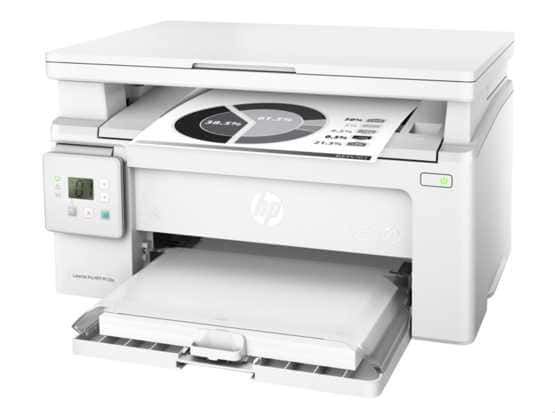
Objectif
Nous allons ici installer l’imprimante 3 en 1 HP LaserJet Pro MFP M130a sous Linux.
La méthode suivante a été testée avec succès sous Debian 10 (que ce soit dans sa version Gnome ou XFCE), cela devrait aussi marcher sur Fedora, Linux Mint ou Ubuntu
Installation des paquets nécessaires
sudo apt install cups hplip simple-scan xsane
Identifier le matériel
La commande lsusb permet d’identifier les périphériques branchés en USB. Vous devriez avoir une ligne ressemblant à celle-ci:
Bus 001 Device 004: ID 03f0:622a HP, Inc
Les chiffres importants ici sont 03f0:622a
L’identification du scanner se fait avec la commande sane-find-scanner, qui devrait vous répondre quelque chose comme
found USB scanner (vendor=0x03f0 [HP], product=0x622a [HP LaserJet MFP M129-M134]) at libusb:002:002
Configuration de l’imprimante
hp-setup -i
Installation du scanner
hp-plugin -i
Il vous faut sélectionner ‘download’ avec d puis confirmer à deux reprises avec y, et enfin entrer votre mot de passe d’administration.
Voici un exemple de réponse du terminal :
HP Linux Imaging and Printing System (ver. 3.18.12)
Plugin Download and Install Utility ver. 2.1
Copyright (c) 2001-15 HP Development Company, LP
This software comes with ABSOLUTELY NO WARRANTY.
This is free software, and you are welcome to distribute it
under certain conditions. See COPYING file for more details.
HP Linux Imaging and Printing System (ver. 3.18.12)
Plugin Download and Install Utility ver. 2.1
| PLUG-IN INSTALLATION FOR HPLIP 3.18.12 |
------------------------------------------
Option Description
---------- --------------------------------------------------
d Download plug-in from HP (recommended)
p Specify a path to the plug-in (advanced)
q Quit hp-plugin (skip installation)
Enter option (d=download*, p=specify path, q=quit) ? d
-------------------
| DOWNLOAD PLUGIN |
-------------------
Checking for network connection...
\Downloading plug-in from:
Downloading plug-in: [\ ] 0% Receiving digital keys: /usr/bin/gpg --homedir /home/user/.hplip/.gnupg --no-permission-warning --keyserver pgp.mit.edu --recv-keys 0x4ABA2F66DBD5A95894910E0673D770CDA59047B9
error: Unable to recieve key from keyserver
Do you still want to install the plug-in? (y=yes, n=no*, q=quit) ? y
error: Please press <enter> or enter 'y', 'n', or 'q'.
Do you still want to install the plug-in? (y=yes, n=no*, q=quit) ? yes
error: Please press <enter> or enter 'y', 'n', or 'q'.
Do you still want to install the plug-in? (y=yes, n=no*, q=quit) ? y
----------------------
| INSTALLING PLUG-IN |
----------------------
Creating directory plugin_tmp
Verifying archive integrity... All good.
Uncompressing HPLIP 3.18.12 Plugin Self Extracting Archive....
HP Linux Imaging and Printing System (ver. 3.18.12)
Plugin Installer ver. 3.0
Copyright (c) 2001-15 HP Development Company, LP
This software comes with ABSOLUTELY NO WARRANTY.
This is free software, and you are welcome to distribute it
under certain conditions. See COPYING file for more details.
Plug-in version: 3.18.12
Installed HPLIP version: 3.18.12
Number of files to install: 55
You must agree to the license terms before installing the plug-in:
LICENSE TERMS FOR HP Linux Imaging and Printing (HPLIP) Driver Plug-in
[...]
Do you accept the license terms for the plug-in (y=yes*, n=no, q=quit) ?
Please enter the root/superuser password:
Done.
Done.
À ce stade, lancer simple-scan devrait permettre de scanner. Dans le cas contraire, continuez la lecture
Commandes supplémentaires
Quelques commandes qui peuvent aider:
Suppression d’imprimantes: hp-setup -ir (une confirmation vous est demandée)
Obtenir des infos : hp-check -t (voir ci-dessous en cas de problème) et hp-doctor
Installation de l’interface graphique de Hplip: sudo apt install hplip-gui (un lanceur est alors créé et vous pouvez lancer hplip-gui comme nimporte qu’elle autre application)
Résolution de problèmes
« No such file or directory: ‘/usr/include/cups’»
Si lorsque vous lancez
sudo hp-check -t
vous obtenez l’erreur suivante
Saving output in log file: /root/hp-check.log
HP Linux Imaging and Printing System (ver. 3.18.12)
Dependency/Version Check Utility ver. 15.1
[...]
/Traceback (most recent call last):
File "/usr/share/hplip/base/utils.py", line 265, in walkFiles
names = os.listdir(root)
FileNotFoundError: [Errno 2] No such file or directory: '/usr/include/cups'
il vous faut installer libcups2-dev comme ceci :
sudo apt install libcups2-dev
Reference: (en anglais) https://answers.launchpad.net/hplip/+question/677845
« No such file or directory: ‘/etc/PolicyKit’»
Si lorsque vous lancez
sudo hp-check -t
vous obtenez l’erreur suivante
Saving output in log file: /root/hp-check.log
HP Linux Imaging and Printing System (ver. 3.18.12)
Dependency/Version Check Utility ver. 15.1
Note: hp-check can be run in three modes:
[...]
Status Types:
OK
MISSING - Missing Dependency or Permission or Plug-in
INCOMPAT - Incompatible dependency-version or Plugin-version
/Traceback (most recent call last):
File "/usr/share/hplip/base/utils.py", line 265, in walkFiles
names = os.listdir(root)
FileNotFoundError: [Errno 2] No such file or directory: '/etc/PolicyKit'
During handling of the above exception, another exception occurred:
Traceback (most recent call last):
File "/usr/share/hplip/base/utils.py", line 267, in walkFiles
raise StopIteration
StopIteration
The above exception was the direct cause of the following exception:
Traceback (most recent call last):
File "/usr/bin/hp-check", line 861, in <module>
dep.core.init()
File "/usr/share/hplip/installer/core_install.py", line 527, in init
self.check_dependencies(callback)
File "/usr/share/hplip/installer/core_install.py", line 620, in check_dependencies
self.have_dependencies[d] = self.dependencies[d][3]()
File "/usr/share/hplip/installer/core_install.py", line 1241, in check_policykit
if check_file('PolicyKit.conf', "/etc/PolicyKit") and check_file('org.gnome.PolicyKit.AuthorizationManager.service', "/usr/share/dbus-1/services"):
File "/usr/share/hplip/installer/dcheck.py", line 107, in check_file
for w in utils.walkFiles(dir, recurse=True, abs_paths=True, return_folders=False, pattern=f):
RuntimeError: generator raised StopIteration
Il vous faut ouvrir le fichier utils.py:
vim /usr/share/hplip/base/utils.py
et à la ligne ~268 (cela peut varier, lancez une recherche dans le fichier si nécessaire), remplacez
raise StopIteration
par
return
Ref: (en anglais) https://bbs.archlinux.org/viewtopic.php?id=239365